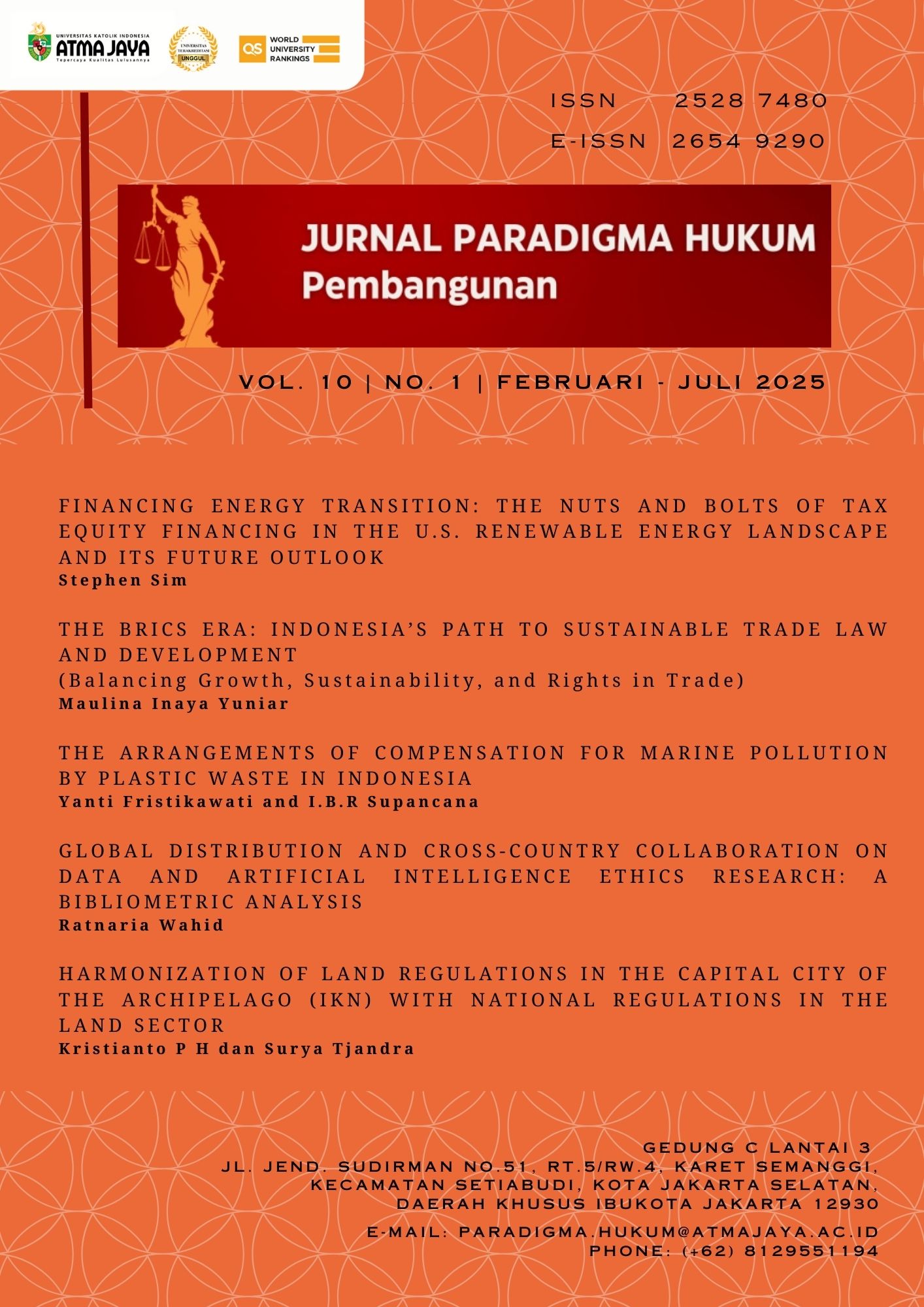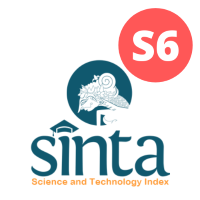GLOBAL DISTRIBUTION AND CROSS-COUNTRY COLLABORATION ON DATA AND ARTIFICIAL INTELLIGENCE ETHICS RESEARCH: A BIBLIOMETRIC ANALYSIS
DOI:
https://doi.org/10.25170/paradigma.v10i1.6517Keywords:
Etnics, Technology, Collaboration, Culture, Policy, Diversity, Digital DevideAbstract
Publications on data and artificial intelligence ethics have grown in importance as more international entities seek to adopt new rules and create international frameworks to manage the same. Concerns remain, however, regarding the fragmented legal landscape and the absence of a unified set of standards for big data and artificial intelligence technology. This study examines data and AI ethical publishing and citation patterns from 1996 to 2022 (26 years). It highlights the leading countries and institutions, prominent research streams, and cross-country collaboration. Bibliometric analysis has been used to extract data from Scopus database. patterns. A title search strategy using particular keywords search was used extracting a total of 331 records. The data was exported to VOS viewer software, Biblioshiny and Excel in order to generate a thorough scientific analysis. This study fills the gap by addressing the issue of international collaboration in data and AI ethics research, and cultural diversity perspectives in the realm of international studies. The findings revealed that 633 authors from 40 different countries have contributed to documents on data and AI ethics. This shows that only a few countries contributed to global research trends in data and AI ethics, indicating a dearth of different perspectives. Computer science and philosophy professors in Western colleges affect data and AI ethics discussions in technology and society journals. Oxford and Cambridge universities offer key viewpoints on the subject, while merely three main clusters of cross-country collaboration took place. This study highlighted the practical implication where emphasis is needed to increase international collaboration in data and AI ethics research to create a more inclusive and equitable global framework. The study serves as the foundation for increased collaboration, which may dispel negative stereotypes, develop social cohesion, promote tolerance, and foster improved decision-making and problem-solving.
References
AlgorithmWatch. (2019), “AI Ethics Guidelines Global Inventory”, available at: https://inventory.algorithmwatch.org/database (accessed 10 April 2022).
Allen, C., Wallach, W. and Smit, I. (2006), “Why machine ethics?,” IEEE Intelligent Systems, 21(4), pp. 12–17. doi: 10.1109/mis.2006.83.
Amarante, V., Burger, R., Chelwa, G., Cockburn, J., Kassouf, A., McKay, A., and Zurbrigg, J. (2022), “Underrepresentation of developing country researchers in development research”, Applied economics letters, 29(17), pp. 1659–1664. doi: 10.1080/13504851.2021.1965528.
Anderson, M., and Anderson, S. L. (2007), “Machine ethics: Creating an ethical intelligent agent”, AI Magazine, Vol. 28 No. 4, p.15, doi.org/10.1609/aimag.v28i4.2065
Applin, S. A. (2019), Everyone’s talking about ethics in AI. Here’s what they’re missing, Fast Company, available at: https://www.fastcompany.com/90356295/the-rush-toward-ethical-ai-is-leaving-many-of-us-behind (accessed 19 May 2022).
Aria, M., and Cuccurullo, C. (2017), “Bibliometrix : An R-tool for comprehensive science mapping analysis”, Journal of Informetrics, Vol. 11 No. 4, pp.959–975. doi.org/10.1016/j.joi.2017.08.007
Awad, E., Dsouza, S., Kim, R., Schulz, J., Henrich, J., Shariff, A., Bonnefon, J.-F., and Rahwan, I. (2018), “The Moral Machine experiment”, Nature, Vol. 563 No. 7729, pp. 59–64. doi.org/10.1038/s41586-018-0637-6
Bharti, C. (2022) “The European union’s proposed artificial intelligence legislation and the path ahead for Asian approaches to artifical intelligence,” in Handbook of Research on Cyber Law, Data Protection, and Privacy. IGI Global, pp. 64–86.
Birchfield, V. L., Roy, V., and Sreedhar, V. (2023), “The EU’s potential to lead in “ethical and secure” artificial intelligence: last, best hope?” Journal of Transatlantic Studies, 1-29.
Borsci, S., Lehtola, V. et.al. (2022), “Embedding artificial intelligence in society: looking beyond the EU AI master plan using the culture cycle”, AI and Society. https://doi.org/10.1007/s00146-021-01383-x
Brundage, M. (2014), “Limitations and risks of machine ethics”, Journal of Experimental and Theoretical Artificial Intelligence, Vol. 26 No. 3, pp. 355–372. doi.org/10.1080/0952813x.2014.895108
Castelvecchi, D. (2019), “AI pioneer: “The dangers of abuse are very real.” Nature. https://doi.org/10.1038/d41586-019-00505-2
Chakravorti, B., Bhalla, A. and Chaturvedi, S. (2019), “Which countries are leading the data economy?”, available at: https://hbr.org/2019/01/which-countries-are-leading-the-data-economy (accessed 19 May 2022).
Chuang, C.-W., Chang, A., Chen, M., Selvamani, M. J. P., and Shia, B.-C. (2022), “A worldwide bibliometric analysis of publications on artificial intelligence and ethics in the past seven decades”, Sustainability, 14(18), 11125. https://doi.org/10.3390/su141811125
Cihon, P. (2019), Standards for AI governance: international standards to enable global coordination in AI research and development. Future of humanity institute technical report. Available at: https://www.fhi.ox.ac.uk/wp-content/uploads/Standards_-FHI-Technical-Report.pdf (accessed 19 May 2022).
Di Cara, N. H. et al. (2022) “Data Ethics Club: Creating a collaborative space to discuss data ethics,” Patterns (New York, N.Y.), 3(7), p. 100537. doi: 10.1016/j.patter.2022.100537.
Dutton, T., Barron, B., and Boskovic, G. (2018). Building An AI World. Cifar.Ca, available at: https://cifar.ca/wp-content/uploads/2020/05/buildinganaiworld_eng.pdf (accessed 19 May 2022)
Elsevier. (n.d.). “Why choose Scopus – Scopus benefits”, available at https://www.elsevier.com/solutions/scopus/why-choose-scopus (accessed 10 April 2022).
Feldstein, S. (2023), “Evaluating Europe’s push to enact AI regulations: how will this influence global norms?” Democratization, 1-18.
Floridi, L. (2019), “Translating principles into practices of digital ethics: Five risks of being unethical”, Philosophy and Technology, Vol. 32 No. 2, pp. 185–193.
Floridi, L., and Taddeo, M. (2016), “What is data ethics?” Philosophical Transactions. Series A, Mathematical, Physical, and Engineering Sciences, Vol. 374 No. 2083. doi.org/10.1098/rsta.2016.0360
Franzke, A. S. (2022), “An exploratory qualitative analysis of AI ethics guidelines”, Journal of Information Communication and Ethics in Society, 20(4), pp. 401–423. doi: 10.1108/jices-12-2020-0125.
Gao, H., and Ding, X. (2022). The research landscape on the artificial intelligence: a bibliometric analysis of recent 20 years. Multimedia Tools and Applications, 81(9), 12973–13001. https://doi.org/10.1007/s11042-022-12208-4
Gewin, V. (2022a) “Decolonization should extend to collaborations, authorship and co-creation of knowledge,” Nature, 612(7938), p. 178. doi: 10.1038/d41586-022-03822-1.
------ (2022b) “Institutions must acknowledge the racist roots in science,” Nature, 612(7938), pp. 178–179. doi: 10.1038/d41586-022-04123-3.
Goffi, E. R. (2021), “The importance of cultural diversity in AI ethics”, available at: https://behorizon.org/the-importance-of-cultural-diversity-in-ai-ethics/ (accessed 10 April 2022).
Greene, T., Dhurandhar, A., and Shmueli, G. (2023), Atomist or holist? A diagnosis and vision for more productive interdisciplinary AI ethics dialogue. Patterns, 4(1). https://doi.org/10.1016/j.patter.2022.100652.
Hagendorff, T. (2020) “Publisher correction to: The ethics of AI ethics: An evaluation of guidelines,” Minds and machines, 30(3), pp. 457–461. doi: 10.1007/s11023-020-09526-7.
Hagerty, A., and Rubinov, I. (2019), “Global AI ethics: A review of the social impacts and ethical implications of artificial intelligence”, In arXiv [cs.CY], available at: http://arxiv.org/abs/1907.07892. (accessed 10 April 2022)
Hanna, R., and Kazim, E. (2021), “Philosophical foundations for digital ethics and AI Ethics: a dignitarian approach”, AI and Ethics, 1(4), 405–423. https://doi.org/10.1007/s43681-021-00040-9
Hassan, R. R., Hassan, N. A., Sallehuddin, I. S., and Abdul Aziz, N. N. (2020), “Facebook for intercultural communication: The foreign students’ experience”, Journal of International Studies, Vol. 16, pp. 25–37. doi.org/10.32890/jis2020.16.2
Jobin, A., Ienca, M., and Vayena, E. (2019), “The global landscape of AI ethics guidelines”, Nature Machine Intelligence, Vol. 1 No. 9, pp. 389–399. doi.org/10.1038/s42256-019-0088-2
Karpa, D., Klarl, T., and Rochlitz, M. (2022). “Artificial Intelligence, Surveillance, and Big Data”, In Advanced Studies in Diginomics and Digitalization (pp. 145–172). Springer International Publishing.
Kerry, C. F., Meltzer, J. P., Renda, A., Engler, A., and Fanni, R. (2021), “Strengthening international cooperation on AI”, available at: https://www.brookings.edu/research/strengthening-international-cooperation-on-ai/ (accessed 10 April 2022).
Khan, A. A., Badshah, S., Liang, P., Waseem, M., Khan, B., Ahmad, A., and Akbar, M. A. (2022), “Ethics of AI: A systematic literature review of principles and challenges”, In Proceedings of the 26th International Conference on Evaluation and Assessment in Software Engineering (pp. 383-392).
Lemke, C., Monett, D., and Mikoleit, M. (2023), “Digital ethics in data-driven organizations and AI ethics as application example”, In Apply Data Science: Introduction, Applications and Projects (pp. 31-48). Wiesbaden: Springer Fachmedien Wiesbaden.
Maleh, Y., Sahid, A., and Belaissaoui, M. (2022), “A practical maturity for information security policy in organizations”, EDPACS, 65(1), 1–11. https://doi.org/10.1080/07366981.2021.1885590
Marcovitch, I., and Rancourt, E. (2022), “A data ethics framework for responsible responsive organizations in the digital world”, Statistical Journal of the IAOS, 38(4), 1161–1172. https://doi.org/10.3233/sji-220067
Montasari, R. (2023) “National artificial intelligence strategies: A comparison of the UK, EU and US approaches with those adopted by state adversaries,” in Advances in Information Security. Cham: Springer International Publishing, pp. 139–164.
Moor, J. H. (2006), “The nature, importance, and difficulty of machine ethics”, IEEE Intelligent Systems, Vol. 21 No. 4, pp. 18–21. doi.org/10.1109/mis.2006.80
Morley, J. et al. (2020) “From what to how: An initial review of publicly available AI ethics tools, methods and research to translate principles into practices,” Science and engineering ethics, 26(4), pp. 2141–2168. doi: 10.1007/s11948-019-00165-5.
Naddaf, M. (2022), “‘Labour advantage’ drives greater productivity at elite universities,” Nature. doi: 10.1038/d41586-022-03784-4.
Nath, R., and Sahu, V. (2020), “The problem of machine ethics in artificial intelligence”, AI and Society, 35(1), 103–111. https://doi.org/10.1007/s00146-017-0768-6
Nature. “How leading nations fare on applying knowledge” (2022) Nature, 612(7939), pp. S12–S13. doi: 10.1038/d41586-022-04206-1.
ÓhÉigeartaigh, S. S., Whittlestone, J., Liu, Y., Zeng, Y., and Liu, Z. (2020), “Overcoming barriers to cross-cultural cooperation in AI ethics and governance”, Philosophy and Technology, Vol. 33 No. 4, pp. 571–593. doi.org/10.1007/s13347-020-00402-x
Parthasarathy, S., Panigrahi, P. K., and Subramanian, G. H. (2023), “A framework for managing ethics in data science projects”, Engineering Reports, e12722.
Puthur, L., Karakunnel, M., Miranda, D., and Arora, T. (2023), “Building A Data Ethical Future”, Journal of Dharma, 48(2), 231-248.
Radu, R. (2021), “Steering the governance of artificial intelligence: national strategies in perspective”, Policy and Society, 40(2), 178–193. https://doi.org/10.1080/14494035.2021.1929728
Reeve, J., Zaugg, I., and Zheng, T. (2022), “Mapping data ethics curricula”, Journal of Information Communication and Ethics in Society, Vol. 20 No. 3, pp. 388–399. doi.org/10.1108/jices-12-2021-0124
Roche, C., Lewis, D., and Wall, P. J. (2021), “Artificial intelligence ethics: An inclusive global discourse?” In arXiv [cs.CY]. http://arxiv.org/abs/2108.09959
Santo Faria, R. M. D. E., Torres, A. I., and Beirão, G. (2023), “Trustworthy Artificial Intelligence and Machine Learning: Implications on Users' Security and Privacy Perceptions”, Confronting Security and Privacy Challenges in Digital Marketing, 73-94.
Sartori, L., and Theodorou, A. (2022), “A sociotechnical perspective for the future of AI: narratives, inequalities, and human control”, Ethics and Information Technology, Vol. 24 No. 1. doi.org/10.1007/s10676-022-09624-3
Singh, A.-M., and Light, M. (2019) “Constraints on the growth of private policing: A comparative international analysis”, Theoretical Criminology, 23(3), 295–314. https://doi.org/10.1177/1362480617733727
Slota, S. C., Fleischmann, K. R., Greenberg, S., Verma, N., Cummings, B., Li, L., and Shenefiel, C. (2022), “Locating the work of artificial intelligence ethics”, Journal of the Association for Information Science and Technology. https://doi.org/10.1002/asi.24638
Tang, X., Li, X. and Ma, F. (2022) “Internationalizing AI: evolution and impact of distance factors,” Scientometrics, 127(1), pp. 181–205. doi: 10.1007/s11192-021-04207-3.
Teferra, D., Sirat, M., and Beneitone, P. (2022), “The imperatives of academic collaboration in Africa, Asia and Latin America”, International Journal of African Higher Education, 9(3), 13–35. https://doi.org/10.6017/ijahe.v9i3.16035
Tidjon, L. N. and Khomh, F. (2023) “The different faces of AI ethics across the world: A principle-to-practice gap analysis,” IEEE transactions on artificial intelligence, 4(4), pp. 820–839. doi: 10.1109/tai.2022.3225132.
Tworek, H. (2019), “How transparency reporting could incentivize irresponsible content moderation”, Centre for International Governance Innovation, 10.
UN News. (2021), “193 countries adopt first-ever global agreement on the Ethics of Artificial Intelligence”, available at: https://news.un.org/en/story/2021/11/1106612 (accessed 10 April 2022).
Von Ingersleben‐Seip, N. (2023), “Competition and cooperation in artificial intelligence standard setting: Explaining emergent patterns”, Review of Policy Research.
Wahid, R., Shukri, S., & Ahmad, M. Z. (2023), “A bibliometric analysis on trends, directions and major players of international relations studies”. Journal of International Studies, 19(1),201-230. https://doi.org/10.32890/jis2023.19.1.8
Downloads
Published
Issue
Section
License
Copyright (c) 2025 Jurnal Paradigma Hukum Pembangunan

This work is licensed under a Creative Commons Attribution-NonCommercial-ShareAlike 4.0 International License.
Diperbolehkan atau tidak mempublikasikan tulisan di resopitory instansi penulis







